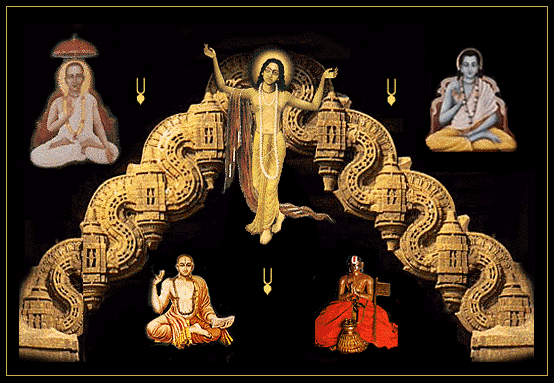Question: Why does a particular sampradaya not just teach as it is what it believes in, instead of trying to compare and contrast with other sampradayas and constantly try to prove its view point or interpretation as the last word?
Answer by Romapada Swami :
I will not attempt here to speak for other traditions and schools of thought but contain this present discussion to our Vaishnava sampradaya. As you are probably aware, there are four Vaishnava sampradayas that are accepted as bona fide, based on the scriptural authority of Padma Purana – the disciplic lines descending from Brahma, Rudra, Kumaras and Sri (Lakshmi).
There are subtle shades of variations among these four sampradayas based on their mood of worship and desired goal, but there are no serious clashes of a fundamental nature nor inherent disagreements amongst these four sampradayas themselves.
As far as the overall Vaishnava theology, it is important to understand that the acharyas or preceptors coming in each of these sampradayas are not simply propounding their viewpoint or interpretation of truth. Rather they are representing an unbroken chain beginning from the Supreme Lord Himself, and are simply repeating His Absolute message. But when there appear other schools of thought that are not in line with the message of God, it is then that differences arise.
For example, Krishna plainly and simply requests in Bhagavad-gita that we give up all other forms of religion and surrender to Him. But some scholar had interpreted it thus: “It is not to Krishna that we have to surrender, but to the unborn within Krishna.” – which is far from the direct meaning of Krishna’s statement. Besides, such an interpretation is not in line with sastras, because it is clearly and repeatedly mentioned throughout scriptures, and in the Gita itself, that Krishna is an Absolute Person, there being no difference between His inside and outside, as in the case of ordinary living entities. He *is* the Unborn, there is no unborn “within” Him. When there are such serious aberrations, and especially when innocent people are misled by such propaganda, there is a dire need for such theories to be refuted and the truth be told!
Devotees of the Lord are least interested in endless logical debates and wranglings to prove their ideological superiority or to promote some personal agenda, although such motivations are not uncommon sometimes amongst intellectuals and dry scholars. Devotees, however, are simply interested in humble service to Godhead. In course of such service to the Lord, it behooves the acharya to distinguish and differentiate right from wrong pictures of Reality for the benefit of the disciples, as well as to establish that the teachings of the parampara are absolute (which they are), and not just another interpretation or theory among many others. It is their solemn responsibility not only to pass down this great science unadulterated but also to safeguard the truth from being misinterpreted or eclipsed by concocted forms of religion, and thereby becoming lost (as Krishna mentions in Bg 4.1-2). Truth cannot be established without dispelling illusion, the deep-rooted misconceptions and deviations from the original conclusion of scripture. (See SB 1.1.2)
In speaking the Bhagavad-gita, the Lord Himself does this a number of times. He addresses some of the typical misconceptions and philosophies of the time, sometimes dismissing them as ignorant or not based on scripture, and at other times strongly condemning them as foolish and demoniac. He also points to different gradations or levels of self-realization and concludes that they all culminate in devotional service to Him (Some examples: 2.42-43, 6.47, 7.24, 12.1-5 etc.). His representatives are simply following in the same spirit.
Far from being self-aggrandizement or criticism of others, their real motivation is compassion, just as you might call out to someone you see heading towards the cliff or strongly object when you see someone you love making a really bad decision. When a devotee sees how much the common people are in ignorance and are being misled by impersonalists, atheists, materialists and pseudo-spiritualists, and how much they are suffering as a result, the devotee is not content to simply present something that may be interpreted as “his viewpoint” but attempts to educate people in general on the Vedic authority, sometimes in the form of a strong and even at times a straightforward and forceful challenge of very harmful misconceptions.
I hope this eases your doubt.







